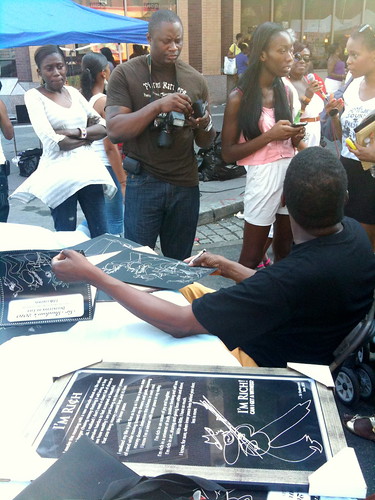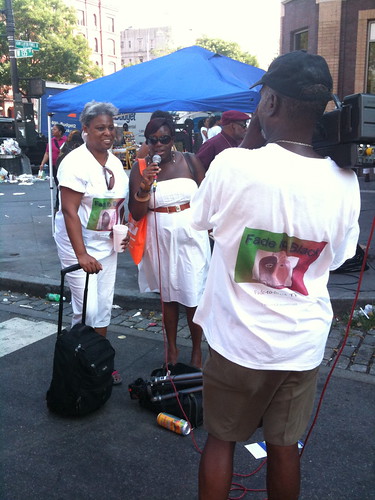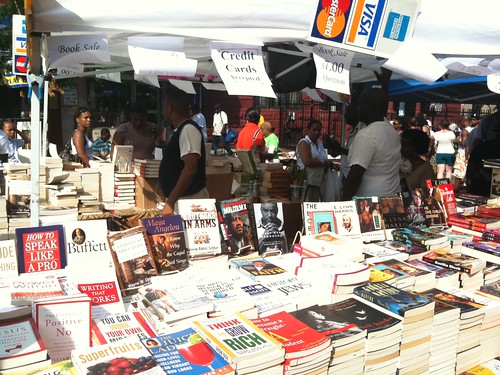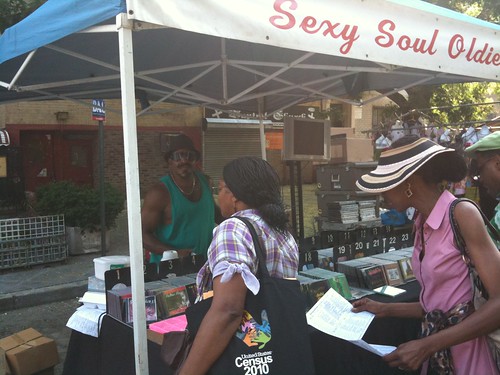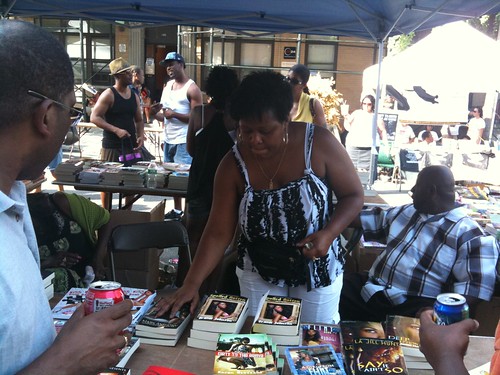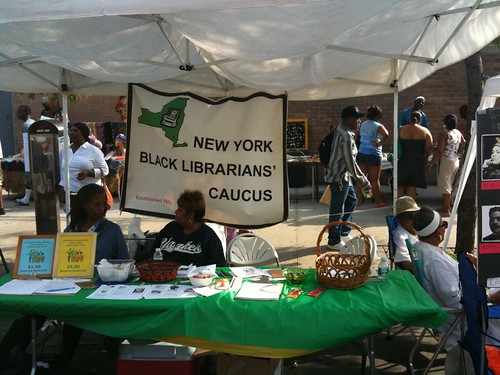Next quarter I'll once again be teaching one of the undergraduate writing program's required courses, one of my favorites, "The Situation of Writing," and one central component of it involves discussing contemporary American literary publishing; the processes by which books come into print or, nowadays, e-print; the relationship between writers, agents, editors, and publishing houses; how writers do or don't make a living from publishing literary works; and so forth.
Increasingly as part of this discussion the issue of the MFA degree and MFA (and PhD in writing/poetics) programs arise, and I have tended to juxtapose lapidary overview texts on 20th century American publishing (like Jason Epstein's charming The Book Business: Publishing Past, Present and Future, W. W. Norton, 2002, or André Schiffrin's much more polemical The Business of Books: How International Conglomerates Took Over Publishing and Changed the Way We Read, Verso, 2001) with more recent journalistic articles on New York publishing's crises as part of the discussion. UCLA professor Mark McGurl's 2009 scholarly book, The Program Era: Post-War Fiction and the Rise of Creative Writing (Harvard), provides an excellent, thoroughgoingly historicized and theorized reading of these programs, which have become increasingly normalized as the means by which American writers become (American) writers, but Mark's remarkable book is 480 pages, and really deserves extended treatment and discussion, worthy of a semester-long graduate seminar, which I unfortunately do not have in a 10-week quarter, especially given the amount of material I must cover.
I was thus extremely pleased to read Chad Harbach's essay "MFA vs. NYC," which appears in the journal n+1 and is excerpted in the November 26, 2010 online edition of Slate. Though it has its faults, as any such wide-ranging, systems-summarizing piece does, from being too binary and tidy to too vague and generalizing in places, it nevertheless provides one of the best overviews of I've seen of what the contemporary American publishing world, both the longstanding, commercial mainstream one (headquarted in New York, but with major nodes in Los Angeles, Boston, Chicago, San Francisco, and Philadelphia), and the increasingly parallel one that has developed in university MFA programs. Whereas I have tended in my classes to discuss the New York one, which is, as Harbach notes, in a period of extreme economic stress and structural change, the parallel one, located in MFA programs, is now as significant and important, and as much as the literary world hasn't fully reckoned with this, I would suggest that outside of figures like McGurl and many writer-critics, the scholarly world hasn't either. Moreover, though my introduction to the writing world was primarily through the New York angle, my personal trajectory has straddled the development of the MFA world, and I am now located within it. I studied in an MFA program and have taught in several; my publishing experience bridges both too. If it is almost impossible now to live off one's literary publications in New York or most major American cities--which was not the case 25 or 30 years ago--it is also growing more and more difficult to get creative writing jobs, because of the supply-and-demand problem and university funding crisis, which, though nowhere near as bad as in the humanities more generally, is worsening. The MFA world, consisting by its very nature of artists, and being situated in the university, is still viewed with suspicion by the scholarly world--what is it that writers do?--and yet it has, as McGurl and Harbach note to differing degrees, as institutionalized and conventionalized as the instutions of which it is a part (and less so each day, apart).
The tensions between these two worlds have played out with several of the major American awards of late, especially the Pulitzer Prize and the National Book Awards for fiction, which have been awarded to MFA-produced and based writers published not published by major houses. In the case of Paul Harding's Tinkers, it famously was rejected by countless major publishers before it found a small publisher and went on to win the Pulitzer.
What Harbach doesn't discuss or even broach (in part because the world of n+1, situated as it is at the nexus of the NYC and MFA worlds, doesn't see it), is a third American literary world-system, however, parallel to both of these, which neither NYC's official publishing hierarchy nor that of the MFA programs, at least in the official sense, takes immediate or consistent note of, but which the structural and above all technological shifts and changes over the last 25 or so years have made possible, which is the autonomous/self-publishing/minoritarian/issue-based/grass-roots writing communities. This world, which is both diminished in key ways as elements of it have been assimilated by the NYC and MFA worlds (queer writing; black writing; black queer writing; etc.) and, for non-creative work, by the institutionalization of criticism, is the world of the slams; the world of community-based minoritarian organizations; the world that produced Language poetry, the Violet Quill, the Fag Rag Collective, OutWrite, Other Countries, Seal Press, Alyson, Gay Men's Press of New York, and so on, and that was already on the wane by the early 1990s. This is a world that many writers of my generation and I also came out of. The Dark Room Writers Collective, my first post-collegiate exposure to the literary world and an autonomous entity based in but distinct from the larger literary world in Cambridge and Boston, was inspired in no small part by and developed out of the historical, social and political trends of this world, as did a great many of the writers (Essex Hemphill, Thomas Grimes, Paul Beatty, Ntozake Shange, etc.) who came through the Dark Room in its earliest days.
But even then, all these competing worlds were already in play, and some of the Dark Room's literary avatars, writers who visited and read and provided advice, like Walker, had been honored by the pinnacle of the New York publishing world, the Pulitzer Prize committee, or Shange by the Obie and Tony Awards; Derek Walcott was an internationally renowned poet teaching in a distinguished M(F)A program, and would soon win the Nobel Prize; and younger writers like Elizabeth Alexander and Carl Phillips were in doctoral humanities programs and had received MAs or MFAs; and the pull of the university was something that every single writer in the Dark Room felt, and eventually followed (or succumbed to, as it were). The NYC publishing world, as I said, has assimilated some writers from this realm, especially the most commercial ones, the older ones of a certain level of distinction and public recognition, and those whose work could be commodified and marketed as part of a niche (a historical style, period, etc.), and academe has done the same, with the focus being on intellectual thematics, schools, critical arguments which these writers might be said to have generated or been a part of. Death and time are powerful passports to either, I hate to say. Nevertheless, a gulf still remains between the work of this sort that continues, independent writing and publishing not attached to or located either in the publishing capitals and not part of any educational institutions (I think, for example, of a superb small press like Redbone Press and its publisher, Lisa Moore, for example), and the NYC and MFA worlds, which have their own concerns, forms and modes of socialization, interests, understandings of politics, and so forth.
One person who always reminds me of this quite thoughtfully is poet and activist Jennifer Karmin, who at the pre-Poets Theater panel discussion broached the issue of resources in relation to the sort of project that had unfolded at Oracle Theater, and who such work was for, who had access to it, what its origins were beyond the ones usually suggested (the New York School coterie, for example, the Beat Poets, and similar groupings). Amiri Baraka, Sarah Schulman, and Sonia Sanchez are other contemporary writers, activists and critics whose life and work have underlined the connections and tensions surrounding these various streams for me. All began in what we might call this alternative or grass-roots stream; all have eventually moved into the university and taught creative writing; all have been honored or recognized, and to some degree published, by the NYC world; but all retain vital connections to the aesthetic and political sites from which they emerged.
I feel this tension in my own life and work, and it lies in part at the core of my critique in the talk I gave at the Museum of Contemporary Art, at the center of what I have been trying to think through but not fully able to articulate yet, has to do with the lack of recognition of this third or alternative stream, in relation to avant-gardism, even though at this point it really the only one capable of addressing, at least in a direct way, the ongoing concerns that many of us feel about the onward march of libertarian-capitalism/neoliberalism/communicative capitalism (to use Jodi Dean's term). It comes up for me every time not just my students, but writers I know in the world, ask no longer whether they should attend an MFA (or PhD) program but take that as a given and want me to parse and rank them, but also when I think about how some of the NYC-based folks, agents, critics, etc., simply could care less about what's happening on campuses, or even more so off them, unless there's the possibility of capitalizing on and somehow effectively commodifying this work so that it can become, well, a means to money, to influence, to a livelihoood.
This brings me back to what I have labeled this alternative stream, which I strongly believe is as crucial for contemporary American art as the other two, and my ongoing wonder about how effective it can it ever be, could it ever be, in a world in which the money remains, at least for the moment in NYC and with mainstream publishing, or what's left of it, while the entropic force and power has moved towards and has now diffused throughout MFA programs is another question, but such are my imperfect and still fully unworked-through thoughts after reading and thinking about Harbach's piece.
Showing posts with label literature. Show all posts
Showing posts with label literature. Show all posts
Wednesday, December 15, 2010
Tuesday, August 31, 2010
Events from July & August, Part 4
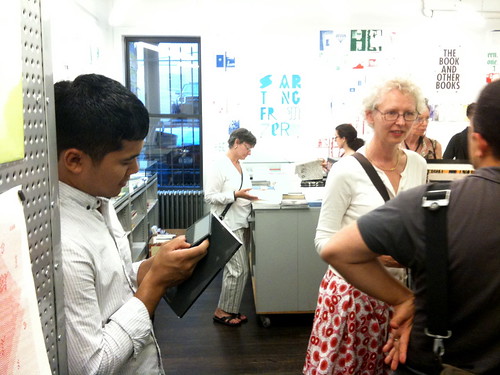
At Printed Matter, Chelsea, for the book launch of Tan Lin's Seven Controlled Vocabularies and Obituary 2004. The Joy of Cooking (Wesleyan, 2010), and its related texts

Tan Lin and a colleague, at Printed Matter
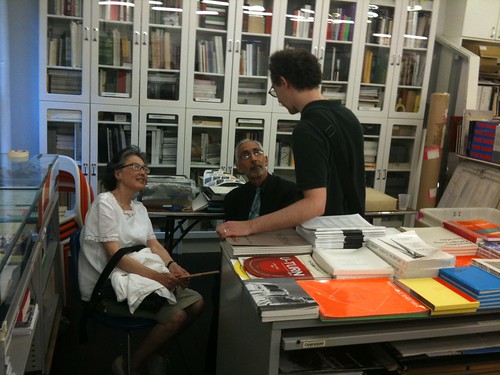
Tan Lin's mother, Gordon Tapper (center), and a friend, at the Printed Matter book launch

Writers David Ebershoff and Gary Shteyngart at a midday reading, Bryant Park

Paulus Hook landing commemoration, Jersey City

Jersey City Puerto Rican Day festival

Jersey City Puerto Rican Day festival
Events from July, Part 3 (Harlem Book Fair)
Sunday, May 30, 2010
Photos: Readings, Events Since April
I managed one post, I think, if even that, from the Associated Writing Programs (AWP) Conference in Denver before I had to shift to intermittent blogging, but I have been snapping photos of lots of events since then, so here are some photos from the last few months. The AWP photos will appear in a separate posting.
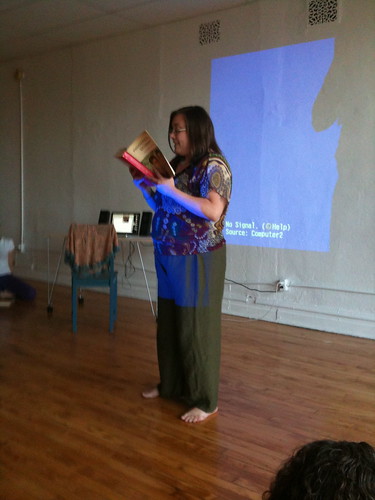
Jennifer Karmin introducing the Red Rover Series Experiment #36 event, "Textual Ecologies & Contaminations," featuring Jennifer Scappettone and Asimina Chremos
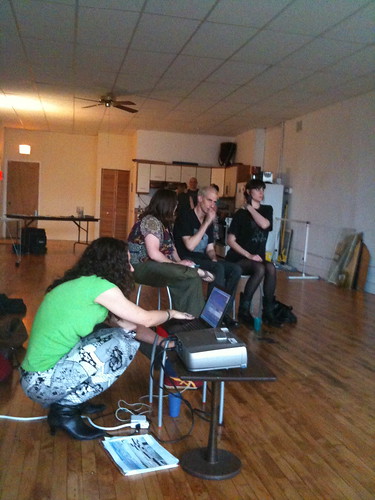
Jennifer Scappettone setting up her performance of Exit 43

Jennifer and part of her chorus performing her piece, Exit 43
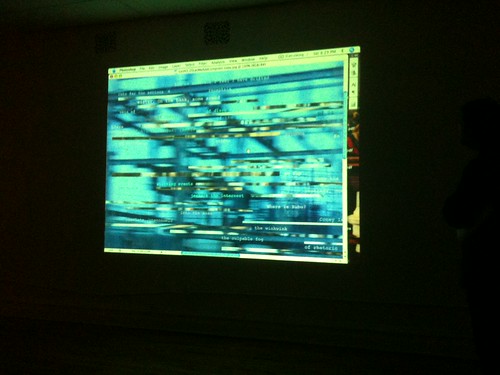
One of Jennifer Scappettone's really beautiful, complex "stills," a pop-up from/within Exit 43
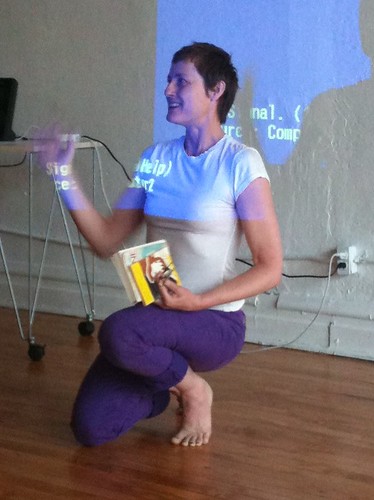
Asimina Chremos, introducing her piece, a collage text with performances (one via Skype)
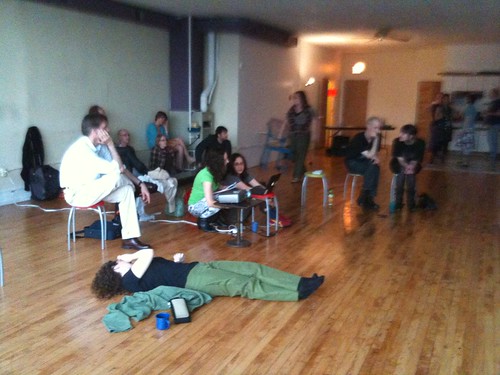
The Red Rover loft audience, between sets

Kathleen Duffy, Jennifer Karmin, and Chris Glomski, performing a quarto from Jennifer's new book, Aaaaaaaaaaalice (Film Forum, 2010), at its launch

Kathleen Duffy, opening the program

Krista Franklin, at Jennifer Karmin's book launch (Krista, Chris Glomski, Kathleen Duffy, Laura Goldstein, Joel Craig, Lisa Janssen, and I all participated/collaborated in this event)
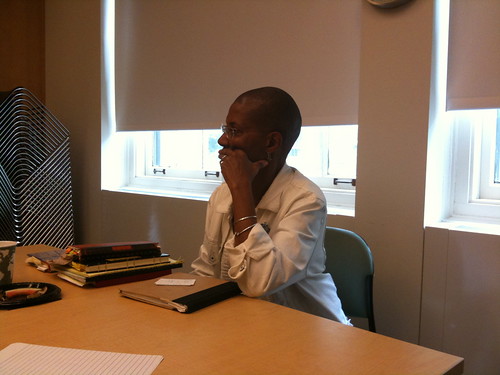
M. NourbeSe Philip, at the Poetry and Poetics Working Group workshop, at the university, in May

My distinguished colleague Sandra Richards, and M. NourbeSe Philip, after Philip's superlative reading from Zong!, in May
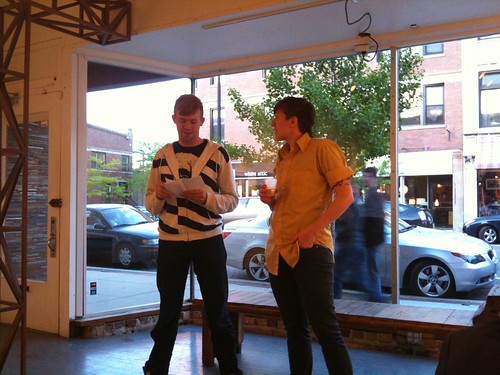
The hosts of the Uncalled For Readings Series at Las Manos Gallery in Andersonville, Tim Jones-Yelvington and Megan Milks, in May

The incomparable Nathanaël (Nathalie Stephens), reading from The Sorrow and the Fast of It at the Uncalled For Readings Series at Las Manos Gallery in Andersonville, in May
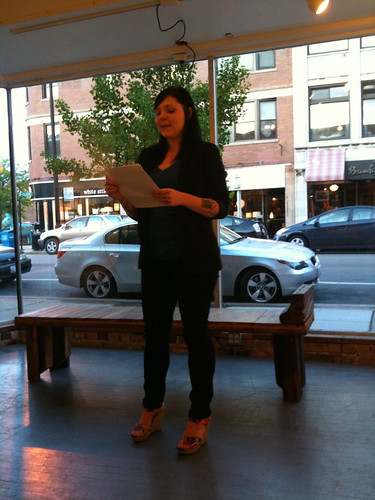
Reader Trish Bendix, reading from her short story at the Uncalled For Readings Series at Las Manos Gallery in Andersonville, in May

Kareem Khubchandani, reading from her short story at the Uncalled For Readings Series at Las Manos Gallery in Andersonville, in May
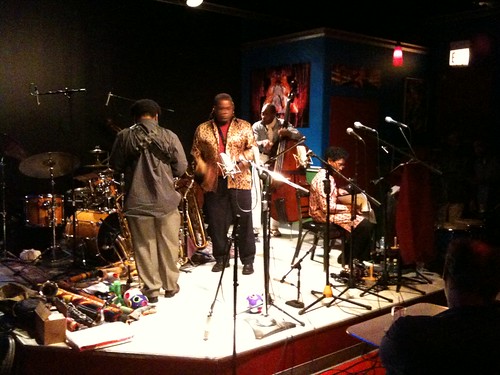
Douglas Ewart and Company, with Duriel Harris (at far right), at the Velvet Lounge, in April
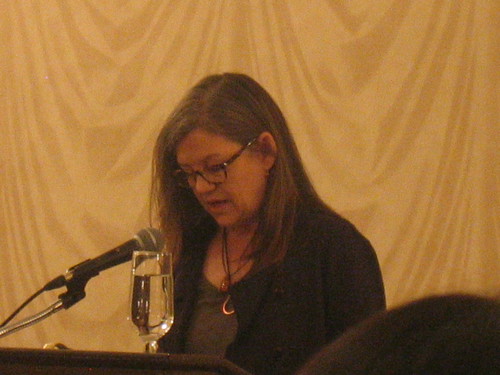
Joanne Beard, reading at the English Major in Writing's annual Writers Festival, in April

Frank Bidart, reading at the English Major in Writing's annual Writers Festival, in April
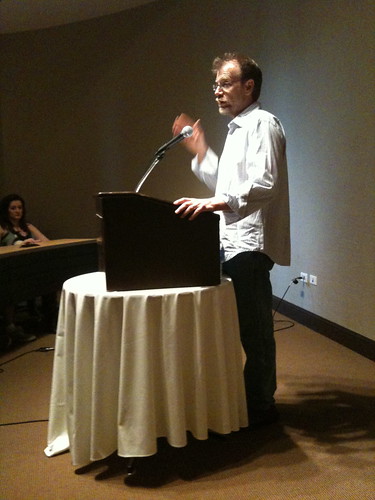
George Saunders, leading his master class, at the English Major in Writing's annual Writers Festival, in April
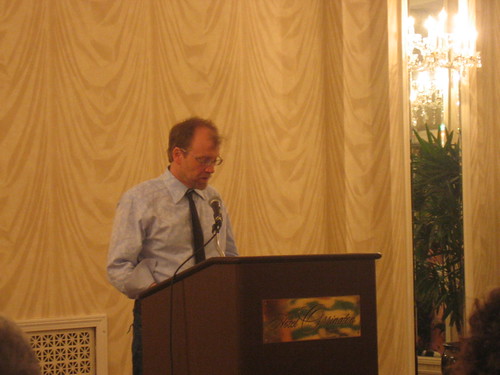
George Saunders, reading at the English Major in Writing's annual Writers Festival, in April

Cristina Henríquez, reading at the alumni reading, at the English Major in Writing's annual Writers Festival, in April

Joshua Weiner, reading at the alumni reading, at the English Major in Writing's annual Writers Festival, in April

Jennifer Karmin introducing the Red Rover Series Experiment #36 event, "Textual Ecologies & Contaminations," featuring Jennifer Scappettone and Asimina Chremos

Jennifer Scappettone setting up her performance of Exit 43

Jennifer and part of her chorus performing her piece, Exit 43

One of Jennifer Scappettone's really beautiful, complex "stills," a pop-up from/within Exit 43

Asimina Chremos, introducing her piece, a collage text with performances (one via Skype)

The Red Rover loft audience, between sets

Kathleen Duffy, Jennifer Karmin, and Chris Glomski, performing a quarto from Jennifer's new book, Aaaaaaaaaaalice (Film Forum, 2010), at its launch

Kathleen Duffy, opening the program

Krista Franklin, at Jennifer Karmin's book launch (Krista, Chris Glomski, Kathleen Duffy, Laura Goldstein, Joel Craig, Lisa Janssen, and I all participated/collaborated in this event)

M. NourbeSe Philip, at the Poetry and Poetics Working Group workshop, at the university, in May

My distinguished colleague Sandra Richards, and M. NourbeSe Philip, after Philip's superlative reading from Zong!, in May

The hosts of the Uncalled For Readings Series at Las Manos Gallery in Andersonville, Tim Jones-Yelvington and Megan Milks, in May

The incomparable Nathanaël (Nathalie Stephens), reading from The Sorrow and the Fast of It at the Uncalled For Readings Series at Las Manos Gallery in Andersonville, in May

Reader Trish Bendix, reading from her short story at the Uncalled For Readings Series at Las Manos Gallery in Andersonville, in May

Kareem Khubchandani, reading from her short story at the Uncalled For Readings Series at Las Manos Gallery in Andersonville, in May

Douglas Ewart and Company, with Duriel Harris (at far right), at the Velvet Lounge, in April

Joanne Beard, reading at the English Major in Writing's annual Writers Festival, in April

Frank Bidart, reading at the English Major in Writing's annual Writers Festival, in April

George Saunders, leading his master class, at the English Major in Writing's annual Writers Festival, in April

George Saunders, reading at the English Major in Writing's annual Writers Festival, in April

Cristina Henríquez, reading at the alumni reading, at the English Major in Writing's annual Writers Festival, in April

Joshua Weiner, reading at the alumni reading, at the English Major in Writing's annual Writers Festival, in April
Monday, October 5, 2009
Review: Capitalism: A Love Story & Nobel Prize Tips?
On Saturday, C and I went to see Michael Moore's new film, Capitalism: A Love Story (2009), just as we'd caught his last two major releases, the prescient Sicko (2007) and the Academy Award-winning Fahrenheit 9/11 (2004), right after they premiered. Like the two prior films, and very much in line with all of his cinematic and TV works, including his début film, Roger and Me (1989), this new film is a passionate, often upsetting and enraging, sometimes muddled, but ultimately very moving attack on the economic and political injustice that plagues this society. Whereas Sicko focused on the broken health care system, and Fahrenheit 911 assayed the Bush administration's misrule and warmongering in the wake of the September 11, 2001 attacks, this film attempts and sometimes succeeds in taking stock of the economic calamity that has befallen us since the waning days of the Bush administration. But Moore expands the window in an attempt to show that last year's collapse, and 2007 initial moment of recession, actually date back to the Reagan years, when fundamental changes in regulation and the economic philosophies that had guided the country shifted, based on politics, to create the toxic brew that has caused a global disaster, and what was nearly the Great Depression 2.0. The film could easily be retitled Capitalism: A Horror Story, since Moore's relentless aim is to show the many depredations that capitalism in its untrammeled US form has wrought, and a series of horrors they are. But he does not, and cannot tie everything together, because he does not address the larger issue of global capitalism and capital flows, or go as far as he appears to want to in terms of the US's situation and propose a solution or alternative, and this, along with his understandably deep faith in Barack Obama's election as a real politically as opposed to symbolically transformational event, ultimately are the film's major weaknesses.
The strongest aspects of Capitalism: A Love Story are the many powerful, disturbing, though sometimes hilarious, set pieces. These include the jaw-droppingly macabre "Dead Peasants"--this is the actual name, not something either he or I thought up--insurance policies corporations take out on their workers; the workers at Chicago's Republic Doors and Windows who refused to accept the horrendous terms of their dismissal, staged a strike, and forced JP Morgan Chase's hand to ensure that they at least got the pittance they were owed before watching their jobs vanish before their eyes; the appalling imprisonment of teenagers with due process in a for-profit private Pennsylvania prison in which two judges overseeing the cases had a financial stake; the "shock doctrine" attempts by former Treasury Secretary Hank Paulson, in collusion with the firm he formerly led, Goldman Sachs, to seize control of the entire Troubled Asset Relief Program (TARP) funds, without any legal or legislative oversight, the popular outrage that temporarily stalled the bill, and the Democrats' capitulation and collaboration in making the theft possible only a little while later; and his designating a huge swathe of Wall Street as a crime scene, with police tape, a megaphone, and confrontations with the door people to boot. Other scenes, such as the ones of people being thrown out of their homes, were redolent of Roger and Me, and as Moore noted, many parts of the country were being transformed into versions of his hometown of Flint, Michigan. The set pieces do succeed in provoking your emotions: disgust, rage, awe, and revenge are among the responses, and validly so, since what becomes clear is that the unalloyed pursuit of money to the exclusion of everything else, which has become what American and global capitalism are, has left a trail of destruction in its wake, and our federal and many state and local governments (bought and paid for) and our mainstream corporate media (collaborators) have actively and passively colluded in making it all possible.

Moore interviewing Indiana Congressperson Baron Hill
Around and through these moments, Moore tries to construct a narrative that can offer a cogent account of how corporate and wealthy interests, in cooperation with both the Republican and Democratic parties, rewrote laws, pushed failed economic policies, robbed the country blind, and then, after devastating everything, managed to salvage as much money for themselves as possible. To his credit, he doesn't just slam the GOP nor does he omit the Clinton administration's participation in all of this. Though the country experienced an unprecedented period of economic growth and expansion from 1994-2000, Clinton's economic team also played a central role in gutting the economy's foundations by pushing for the repeal of Glass-Steagall and the imposition of NAFTA, championing outsourcing and the smoke-and-mirrors industrial-structural transformation to a service economy, and generally accepting the false logic of neoliberalism and conservative/supply-side macroeconomics. He only touches upon part of this, though, and he could easily have gone further back than Reagan; in fact, in the period after the US began large-scale industrialization, the fin-de-siècle battles around monopolization, the Gilded Age and go-go laissez-faire capitalism leading up to the 1929 Stock Market crash and Great Depression gave an instructive, unforgettable preview of what we would be facing if we followed the same terrible patterns of the past.
Along the way, the film identifies a few heroes in this horror story, chief among them Ohio Democratic Congressperson Marcy Kaptur, who clearly and defiantly lays out the stakes and makes clear who is really running the country. There are also some liberal-minded clergy people, including a veritable hippy priest, who condemn capitalism as contravening the Gospels. I really wish he'd gone further on this score, and pointed out not only the Christianist hypocrisy of the contemporary right-wing, but the silence of so many people of faith in the face of the growing economic inequalities we witnessed, the rampant unfairness, unethical and immoral behavior, the amorality of destroying others' lives to enrich one's own, and so forth. Where were the bishops, the rabbis, the imams, as W Bush was bleeding us all dry? Not only was the Iraq War a festering debacle, but also those tax cuts and the attendant spending binges and, even worse, insane borrowing, the refinancing and buybacks, the incessant building, and the shell games and Ponzi schemes that have left us trillions of dollars in the hole, and 7 million jobs poorer. The silence of these clergy people also was as "evil," if you accept the term Moore bandies about, as the hazy "capitalism" that he indicts. I take his point, but find the term, and those uttering it, too simplistic, since it shorts out any real discussion about the nature of economic systems and what they can and cannot provide. Yet Moore also suggests that we might have "capitalism" that isn't so out-of-control when he speaks with Socialist-turned-Independent Bernie Sanders of the "gay state" as he cheekily calls it, of Vermont. In fact Sanders calls himself a Democratic Socialist, and Moore points to European models that might offer a better, or at least more economically and socially equitable way. To get it, we may need a revolution, but in reverse from the one we've endured in unbroken form since the Reagan era. Moore however cannot bring himself to go that far--and doesn't much cite our own national history of early 20th century Progressives, American Socialism and Communism, as well as a much more empowered and radical Democratic Party, particularly during the 4-term tenure of Franklin Delano Roosevelt. Instead he suggests that "Democracy" is the answer. But that simply doesn't make sense, and I gathered throughout that Moore knows this. But to call for a socialist revolt beyond the ballot box would, unfortunately, be beyond the pale even for a man so vilified by those on the right. He wants--and I think we need--lots of Americans to see this movie. Badly.

Michael Moore callling out the robber barons on Wall Street
Perhaps his most misplaced hope in the film is on Barack Obama's election. On the one hand, it was a remarkable event, and if one were to have vaguely followed Obama's rhetoric during the campaign, he seemed to promise real change. But closer listening showed him to be a pragmatist at best (even if a progressive on some issues at heart), and he has followed his Democratic predecessor in doing little to dismantle many of the worst aspects of the right-wing apparatus he's walked into. In fact, he basically hired the people who helped initiate the economic collapse! Moore does point out that the financial industries showered Obama with cash once he became the nominee and later won the election, but doesn't delve deeply enough into this. We can see the effects with the health care debate; the administration, along with Democrats like Max Baucus, appear to want nothing more than a symbolic bill that would primarily reward their corporate funders. They pay lip service to their constituents, who are overwhelmingly in favor of a more progressive bill, but have done everything they could, as Reagan, HW Bush and W would, to appease the wealthiest and thus most powerful interests. Not even doctors or nurses have had as much input as the insurance, pharmaceutical, hospital, and nursing home industries and their lobbyists, and that input--influence--takes the form of money. I understand Moore's idealism, which is a powerful undertow here, as in all of his films, but more clearsightedness, on Obama as a politician like every other one, would have strengthened the film's overall argument.
Nevertheless, as I said, Capitalism: A Love Story, is a film I hope millions of Americans, especially middle, working-class and poor ones, do get an opportunity to see. I fear not enough of us will see this film; even with its problems, it provokes a great deal of thought and soul-searching, and its revelations, even though many of them are well known, are worth seeing set forth as only Michael Moore can do. As he might say, Thank God for him.
***
I must add a link to three New York Times stories on the private equity industry shell game that has now ensnared institutions like Harvard, Yale and Stanford Universities. Moore did not touch this at all, except tangentially, but as each piece shows, the people who engineer these disasters rarely if ever lose.
Private Equity Industry: Another Horror Story
Profits for Buyout Firms as Company Debt Soars
An Executive Who Ruled from Afar and Walked Away Rich
Videos on private equity industry
===
Congratulations to this year's Nobel Laureates in physiology or medicine, Elizabeth H. Blackburn of the University of California, San Francisco; Carol W. Greider of the Johns Hopkins University Medical School; and Jack W. Szostak of the Harvard University Medical School and Howard Hughes Medical Institute for their "discovery of how chromosomes are protected by telomeres and the enzyme telomerase." According to several reports I've read, their work is central to understanding the biological mechanisms involved in aging, as well as in cancer research. I also saw that their award marks the first time that two women have jointly received the Nobel Prize in this category.
Today's announcement of this year's first Nobel Prizes means that at some point later this week or early next, the Nobel Prize in Literature will be awarded. Every year (or almost) that I've posted this blog, I've offered my speculations about the winners. Usually it's been a miss, though I did include Harold Pinter among my predictions--he was one of a vast cast--the year he won. Like most prognosticators and littérateurs, however, I was caught off guard by last year's award, J. G. M. LeClézio, who, from all that I can tell, remains in obscurity--not that fame or notoriety should ever be qualifications for this award. Still, his selection was surprising (especially over better known, influential French writers including Yves Bonnefoy, Michel Tournier, Anne-Marie Albiach, and Jacques Roubaud), and made me wonder what the committee, whose machinations have involved public uproars during the last decade, was thinking, and what the LeClézio pick might in terms of subsequent years.
 In recent years the Swedish Academy, which awards the Nobel Prize in literature, has neglected poetry in favor of fiction; no author primarily writing poetry has received the award since Wyslawa Szymborska in 1996. Only two women have received the award over the last 10 years (Elfriede Jelinek in 2004 and Doris Lessing, two years ago). I'd thought these imbalances would be righted last year, but they were not, and so I believe they will this year. Also, despite Lessing's award in 2007, there have been very few winners from Africa; there has also been very few laureates named from Asia (only two from Japan and one from China), and in recent years almost none from the Middle East, Central America, South America, or the Caribbean. There are many reasons why, not the least being the Academy's European location and slant, another being the ways the global literary system works. Nevertheless, I think this year will be different, and am tipping a woman poet or playwright from South America or the Caribbean, Asia, or Africa, though at theOr another country in North America other than the US. One possibly and great choice, I think, would be Margaret Atwood. I'm not sure if Alice Munro's US links disqualify her, but I she ought to be a top candidate.
In recent years the Swedish Academy, which awards the Nobel Prize in literature, has neglected poetry in favor of fiction; no author primarily writing poetry has received the award since Wyslawa Szymborska in 1996. Only two women have received the award over the last 10 years (Elfriede Jelinek in 2004 and Doris Lessing, two years ago). I'd thought these imbalances would be righted last year, but they were not, and so I believe they will this year. Also, despite Lessing's award in 2007, there have been very few winners from Africa; there has also been very few laureates named from Asia (only two from Japan and one from China), and in recent years almost none from the Middle East, Central America, South America, or the Caribbean. There are many reasons why, not the least being the Academy's European location and slant, another being the ways the global literary system works. Nevertheless, I think this year will be different, and am tipping a woman poet or playwright from South America or the Caribbean, Asia, or Africa, though at theOr another country in North America other than the US. One possibly and great choice, I think, would be Margaret Atwood. I'm not sure if Alice Munro's US links disqualify her, but I she ought to be a top candidate.
Other leading candidates include poets such as Claribel Alegria, Adélia Prado, Vénus Khoury-Ghata, and Shu Ting. Other leading candidates include fiction writers (some of whom write poetry and plays) like Assia Djebar, Hélène Cixous, Luisa Valenzuela, Patricia Grace (who received the 2007 Neustadt International Prize), Duong Thu Huong (above right, http://kobason.spaces.live.com/blog/) Mahasveta Devi, and Andrée Chedid. Despite the heavy Eurocentric cast of recent years, I wonder if it would not have gone to Danish poet Inger Christensen had she not passed away earlier. I also keep in mind that no writer from India, Brazil, Vietnam, Indonesia, New Zealand, Argentina, Thailand, or many other countries, has ever received the award.
Considering male writers, Adonis/Adunis, who would be the first male poet writing in Arabic to win, remains a contender. Other less likely choices that I could foresee include: Wilson Harris, Haruki Murakami, Ko Un, Bei Dao, Antonio Lobo Antunes, Kamau Brathwaite, Jay Wright, Javier Marías, Homero Aridjis, David Malouf, Nuruddin Farah, Philip Roth, Édouard Glissant, and John Ashbery. Most are international known and renowned, some more so than others. Whether they're registering--well, Roth is--on the Swedish Academy's radar is another matter. There are former teachers, colleagues, and even some friends whom I think ought to at least be nominated, but you have to be on the Swedish Academy's hotlist to make that occur.
Reggie sends a link saying that British bookies have tipped Amos Oz, Assia Djebar, Joyce Carol Oates, Roth, and Adonis as their top 5. Oates? Really? (Among Israel writers, I think Aharon Shabtai, David Grossman, Yoel Hoffman, and even Aharon Appelfeld would be stronger candidates.) Among their other picks: Antonio Tabucchi, Claudio Magris, Murakami, Herta Müller, Luis Goytisolo (not Juan?), Pynchon (very unlikely), Ismail Kadare, Un, and Tomas Tranströmer. They put William Gass at 100/1...
The strongest aspects of Capitalism: A Love Story are the many powerful, disturbing, though sometimes hilarious, set pieces. These include the jaw-droppingly macabre "Dead Peasants"--this is the actual name, not something either he or I thought up--insurance policies corporations take out on their workers; the workers at Chicago's Republic Doors and Windows who refused to accept the horrendous terms of their dismissal, staged a strike, and forced JP Morgan Chase's hand to ensure that they at least got the pittance they were owed before watching their jobs vanish before their eyes; the appalling imprisonment of teenagers with due process in a for-profit private Pennsylvania prison in which two judges overseeing the cases had a financial stake; the "shock doctrine" attempts by former Treasury Secretary Hank Paulson, in collusion with the firm he formerly led, Goldman Sachs, to seize control of the entire Troubled Asset Relief Program (TARP) funds, without any legal or legislative oversight, the popular outrage that temporarily stalled the bill, and the Democrats' capitulation and collaboration in making the theft possible only a little while later; and his designating a huge swathe of Wall Street as a crime scene, with police tape, a megaphone, and confrontations with the door people to boot. Other scenes, such as the ones of people being thrown out of their homes, were redolent of Roger and Me, and as Moore noted, many parts of the country were being transformed into versions of his hometown of Flint, Michigan. The set pieces do succeed in provoking your emotions: disgust, rage, awe, and revenge are among the responses, and validly so, since what becomes clear is that the unalloyed pursuit of money to the exclusion of everything else, which has become what American and global capitalism are, has left a trail of destruction in its wake, and our federal and many state and local governments (bought and paid for) and our mainstream corporate media (collaborators) have actively and passively colluded in making it all possible.

Moore interviewing Indiana Congressperson Baron Hill
Around and through these moments, Moore tries to construct a narrative that can offer a cogent account of how corporate and wealthy interests, in cooperation with both the Republican and Democratic parties, rewrote laws, pushed failed economic policies, robbed the country blind, and then, after devastating everything, managed to salvage as much money for themselves as possible. To his credit, he doesn't just slam the GOP nor does he omit the Clinton administration's participation in all of this. Though the country experienced an unprecedented period of economic growth and expansion from 1994-2000, Clinton's economic team also played a central role in gutting the economy's foundations by pushing for the repeal of Glass-Steagall and the imposition of NAFTA, championing outsourcing and the smoke-and-mirrors industrial-structural transformation to a service economy, and generally accepting the false logic of neoliberalism and conservative/supply-side macroeconomics. He only touches upon part of this, though, and he could easily have gone further back than Reagan; in fact, in the period after the US began large-scale industrialization, the fin-de-siècle battles around monopolization, the Gilded Age and go-go laissez-faire capitalism leading up to the 1929 Stock Market crash and Great Depression gave an instructive, unforgettable preview of what we would be facing if we followed the same terrible patterns of the past.
Along the way, the film identifies a few heroes in this horror story, chief among them Ohio Democratic Congressperson Marcy Kaptur, who clearly and defiantly lays out the stakes and makes clear who is really running the country. There are also some liberal-minded clergy people, including a veritable hippy priest, who condemn capitalism as contravening the Gospels. I really wish he'd gone further on this score, and pointed out not only the Christianist hypocrisy of the contemporary right-wing, but the silence of so many people of faith in the face of the growing economic inequalities we witnessed, the rampant unfairness, unethical and immoral behavior, the amorality of destroying others' lives to enrich one's own, and so forth. Where were the bishops, the rabbis, the imams, as W Bush was bleeding us all dry? Not only was the Iraq War a festering debacle, but also those tax cuts and the attendant spending binges and, even worse, insane borrowing, the refinancing and buybacks, the incessant building, and the shell games and Ponzi schemes that have left us trillions of dollars in the hole, and 7 million jobs poorer. The silence of these clergy people also was as "evil," if you accept the term Moore bandies about, as the hazy "capitalism" that he indicts. I take his point, but find the term, and those uttering it, too simplistic, since it shorts out any real discussion about the nature of economic systems and what they can and cannot provide. Yet Moore also suggests that we might have "capitalism" that isn't so out-of-control when he speaks with Socialist-turned-Independent Bernie Sanders of the "gay state" as he cheekily calls it, of Vermont. In fact Sanders calls himself a Democratic Socialist, and Moore points to European models that might offer a better, or at least more economically and socially equitable way. To get it, we may need a revolution, but in reverse from the one we've endured in unbroken form since the Reagan era. Moore however cannot bring himself to go that far--and doesn't much cite our own national history of early 20th century Progressives, American Socialism and Communism, as well as a much more empowered and radical Democratic Party, particularly during the 4-term tenure of Franklin Delano Roosevelt. Instead he suggests that "Democracy" is the answer. But that simply doesn't make sense, and I gathered throughout that Moore knows this. But to call for a socialist revolt beyond the ballot box would, unfortunately, be beyond the pale even for a man so vilified by those on the right. He wants--and I think we need--lots of Americans to see this movie. Badly.

Michael Moore callling out the robber barons on Wall Street
Perhaps his most misplaced hope in the film is on Barack Obama's election. On the one hand, it was a remarkable event, and if one were to have vaguely followed Obama's rhetoric during the campaign, he seemed to promise real change. But closer listening showed him to be a pragmatist at best (even if a progressive on some issues at heart), and he has followed his Democratic predecessor in doing little to dismantle many of the worst aspects of the right-wing apparatus he's walked into. In fact, he basically hired the people who helped initiate the economic collapse! Moore does point out that the financial industries showered Obama with cash once he became the nominee and later won the election, but doesn't delve deeply enough into this. We can see the effects with the health care debate; the administration, along with Democrats like Max Baucus, appear to want nothing more than a symbolic bill that would primarily reward their corporate funders. They pay lip service to their constituents, who are overwhelmingly in favor of a more progressive bill, but have done everything they could, as Reagan, HW Bush and W would, to appease the wealthiest and thus most powerful interests. Not even doctors or nurses have had as much input as the insurance, pharmaceutical, hospital, and nursing home industries and their lobbyists, and that input--influence--takes the form of money. I understand Moore's idealism, which is a powerful undertow here, as in all of his films, but more clearsightedness, on Obama as a politician like every other one, would have strengthened the film's overall argument.
Nevertheless, as I said, Capitalism: A Love Story, is a film I hope millions of Americans, especially middle, working-class and poor ones, do get an opportunity to see. I fear not enough of us will see this film; even with its problems, it provokes a great deal of thought and soul-searching, and its revelations, even though many of them are well known, are worth seeing set forth as only Michael Moore can do. As he might say, Thank God for him.
***
I must add a link to three New York Times stories on the private equity industry shell game that has now ensnared institutions like Harvard, Yale and Stanford Universities. Moore did not touch this at all, except tangentially, but as each piece shows, the people who engineer these disasters rarely if ever lose.
Private Equity Industry: Another Horror Story
Profits for Buyout Firms as Company Debt Soars
An Executive Who Ruled from Afar and Walked Away Rich
Videos on private equity industry
===
Congratulations to this year's Nobel Laureates in physiology or medicine, Elizabeth H. Blackburn of the University of California, San Francisco; Carol W. Greider of the Johns Hopkins University Medical School; and Jack W. Szostak of the Harvard University Medical School and Howard Hughes Medical Institute for their "discovery of how chromosomes are protected by telomeres and the enzyme telomerase." According to several reports I've read, their work is central to understanding the biological mechanisms involved in aging, as well as in cancer research. I also saw that their award marks the first time that two women have jointly received the Nobel Prize in this category.
Today's announcement of this year's first Nobel Prizes means that at some point later this week or early next, the Nobel Prize in Literature will be awarded. Every year (or almost) that I've posted this blog, I've offered my speculations about the winners. Usually it's been a miss, though I did include Harold Pinter among my predictions--he was one of a vast cast--the year he won. Like most prognosticators and littérateurs, however, I was caught off guard by last year's award, J. G. M. LeClézio, who, from all that I can tell, remains in obscurity--not that fame or notoriety should ever be qualifications for this award. Still, his selection was surprising (especially over better known, influential French writers including Yves Bonnefoy, Michel Tournier, Anne-Marie Albiach, and Jacques Roubaud), and made me wonder what the committee, whose machinations have involved public uproars during the last decade, was thinking, and what the LeClézio pick might in terms of subsequent years.
 In recent years the Swedish Academy, which awards the Nobel Prize in literature, has neglected poetry in favor of fiction; no author primarily writing poetry has received the award since Wyslawa Szymborska in 1996. Only two women have received the award over the last 10 years (Elfriede Jelinek in 2004 and Doris Lessing, two years ago). I'd thought these imbalances would be righted last year, but they were not, and so I believe they will this year. Also, despite Lessing's award in 2007, there have been very few winners from Africa; there has also been very few laureates named from Asia (only two from Japan and one from China), and in recent years almost none from the Middle East, Central America, South America, or the Caribbean. There are many reasons why, not the least being the Academy's European location and slant, another being the ways the global literary system works. Nevertheless, I think this year will be different, and am tipping a woman poet or playwright from South America or the Caribbean, Asia, or Africa, though at theOr another country in North America other than the US. One possibly and great choice, I think, would be Margaret Atwood. I'm not sure if Alice Munro's US links disqualify her, but I she ought to be a top candidate.
In recent years the Swedish Academy, which awards the Nobel Prize in literature, has neglected poetry in favor of fiction; no author primarily writing poetry has received the award since Wyslawa Szymborska in 1996. Only two women have received the award over the last 10 years (Elfriede Jelinek in 2004 and Doris Lessing, two years ago). I'd thought these imbalances would be righted last year, but they were not, and so I believe they will this year. Also, despite Lessing's award in 2007, there have been very few winners from Africa; there has also been very few laureates named from Asia (only two from Japan and one from China), and in recent years almost none from the Middle East, Central America, South America, or the Caribbean. There are many reasons why, not the least being the Academy's European location and slant, another being the ways the global literary system works. Nevertheless, I think this year will be different, and am tipping a woman poet or playwright from South America or the Caribbean, Asia, or Africa, though at theOr another country in North America other than the US. One possibly and great choice, I think, would be Margaret Atwood. I'm not sure if Alice Munro's US links disqualify her, but I she ought to be a top candidate.Other leading candidates include poets such as Claribel Alegria, Adélia Prado, Vénus Khoury-Ghata, and Shu Ting. Other leading candidates include fiction writers (some of whom write poetry and plays) like Assia Djebar, Hélène Cixous, Luisa Valenzuela, Patricia Grace (who received the 2007 Neustadt International Prize), Duong Thu Huong (above right, http://kobason.spaces.live.com/blog/) Mahasveta Devi, and Andrée Chedid. Despite the heavy Eurocentric cast of recent years, I wonder if it would not have gone to Danish poet Inger Christensen had she not passed away earlier. I also keep in mind that no writer from India, Brazil, Vietnam, Indonesia, New Zealand, Argentina, Thailand, or many other countries, has ever received the award.
Considering male writers, Adonis/Adunis, who would be the first male poet writing in Arabic to win, remains a contender. Other less likely choices that I could foresee include: Wilson Harris, Haruki Murakami, Ko Un, Bei Dao, Antonio Lobo Antunes, Kamau Brathwaite, Jay Wright, Javier Marías, Homero Aridjis, David Malouf, Nuruddin Farah, Philip Roth, Édouard Glissant, and John Ashbery. Most are international known and renowned, some more so than others. Whether they're registering--well, Roth is--on the Swedish Academy's radar is another matter. There are former teachers, colleagues, and even some friends whom I think ought to at least be nominated, but you have to be on the Swedish Academy's hotlist to make that occur.
Reggie sends a link saying that British bookies have tipped Amos Oz, Assia Djebar, Joyce Carol Oates, Roth, and Adonis as their top 5. Oates? Really? (Among Israel writers, I think Aharon Shabtai, David Grossman, Yoel Hoffman, and even Aharon Appelfeld would be stronger candidates.) Among their other picks: Antonio Tabucchi, Claudio Magris, Murakami, Herta Müller, Luis Goytisolo (not Juan?), Pynchon (very unlikely), Ismail Kadare, Un, and Tomas Tranströmer. They put William Gass at 100/1...
Subscribe to:
Posts (Atom)

